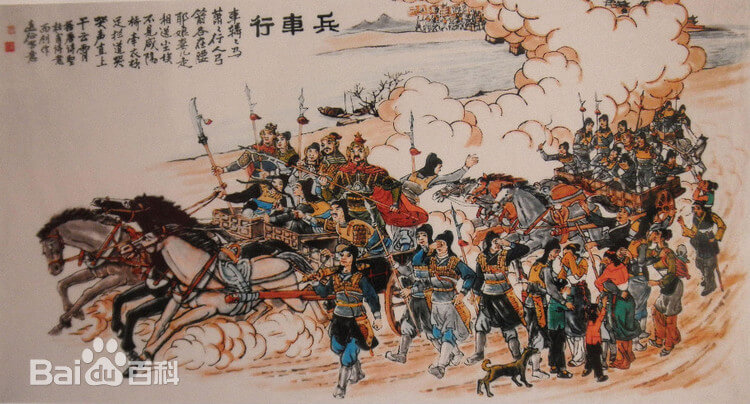A Song of War-Chariots
- Poetry of Du Fu

The war-chariots rattle,
The war-horses whinny.
Each man of you has a bow and a quiver at his belt.
Father, mother, son, wife, stare at you going,
Till dust shall have buried the bridge beyond Changan.
They run with you, crying, they tug at your sleeves,
And the sound of their sorrow goes up to the clouds;
And every time a bystander asks you a question,
You can only say to him that you have to go.
...We remember others at fifteen sent north to guard the river
And at forty sent west to cultivate the campfarms.
The mayor wound their turbans for them when they started out.
With their turbaned hair white now, they are still at the border,
At the border where the blood of men spills like the sea --
And still the heart of Emperor Wu is beating for war.
...Do you know that, east of China's mountains, in two hundred districts
And in thousands of villages, nothing grows but weeds,
And though strong women have bent to the ploughing,
East and west the furrows all are broken down?
...Men of China are able to face the stiffest battle,
But their officers drive them like chickens and dogs.
Whatever is asked of them,
Dare they complain?
For example, this winter
Held west of the gate,
Challenged for taxes,
How could they pay?
...We have learned that to have a son is bad luck-
It is very much better to have a daughter
Who can marry and live in the house of a neighbour,
While under the sod we bury our boys.
...Go to the Blue Sea, look along the shore
At all the old white bones forsaken --
New ghosts are wailing there now with the old,
Loudest in the dark sky of a stormy day.
Folk-song-styled-verse
This poem dates from around 750 or 751.
车辚辚,马萧萧,行人弓箭各在腰。
耶娘妻子走相送,尘埃不见咸阳桥。
牵衣顿足拦道哭,哭声直上干云霄。
道傍过者问行人,行人但云点行频。
或从十五北防河,便至四十西营田。
去时里正与裹头,归来头白还戍边。
边庭流血成海水,武皇开边意未已。
君不闻汉家山东二百州,千村万落生荆杞。
纵有健妇把锄犁,禾生陇亩无东西。
况复秦兵耐苦战,被驱不异犬与鸡。
长者虽有问,役夫敢申恨?
且如今年冬,未休关西卒。
县官急索租,租税从何出?
信知生男恶,反是生女好。
生女犹得嫁比邻,生男埋没随百草。
君不见,青海头,古来白骨无人收。
新鬼烦冤旧鬼哭,天阴雨湿声啾啾!
- Why Chinese poems is so special?
- The most distinctive features of Chinese poetry are: concision- many poems are only four lines, and few are much longer than eight; ambiguity- number, tense and parts of speech are often undetermined, creating particularly rich interpretative possibilities; and structure- most poems follow quite strict formal patterns which have beauty in themselves as well as highlighting meaningful contrasts.
- How to read a Chinese poem?
- Like an English poem, but more so. Everything is there for a reason, so try to find that reason. Think about all the possible connotations, and be aware of the different possibilities of number and tense. Look for contrasts: within lines, between the lines of each couplet and between successive couplets. Above all, don't worry about what the poet meant- find your meaning.
- · Treading on Grass: After Rain the Landscape’s Fair
- · Tipsy Verse
- · Seated with Fangweng
- · Rain and the Mountain
- · Prelude to Water Melody: Bows and Swords Venture Beyond the Pass
- · Spring in Qin Garden: Painted Prows Pierce the Sky
- · The Trader’s Joy
- · Seeking the Hermitage of the Reverend Yong
- · Dedicated to Yuan Danqiu’s Mountain Home
- · The Temple on the Summit